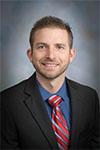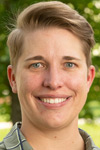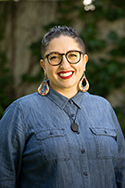


Select one of the options below:
Build the advanced knowledge and skills to pursue a career in higher education leadership by earning your degree with CSU Online.
Develop the competencies you need to successfully and ethically lead higher education institutions with a Ph.D. in higher education leadership. Send a clear message to your current employer that you are committed to the mission of your institution, and gain skills that can be applied immediately to the challenges you face as a professional through a program that:
With a specific focus on universities and colleges, this program provides the practical knowledge needed to advance your administrative career in higher education. Your studies will prepare you to take on leadership roles in:
CSU’s Ph.D. in educational leadership sets itself apart with a 95% retention rate of its students, much higher than the national average of 50%. Here are a few reasons why:
John Carmichael, a graduate of the program, had this to say:
“You hear stories of people who get lost in Ph.D. programs and a decade goes by and they’re still working on their dissertation or taking another course. That has not been at all the experience for me, or I think any of the other people in this program.”
Learn from active scholars who incorporate their experience as administrators and teachers into coursework. The faculty in this online Ph.D. in higher education are skilled educators with industry expertise and extensive careers in higher education, including former vice presidents and college presidents.
Find out how CSU’s research is making an impact by tuning into the Health and Human Science Matters Podcast, a collection of lively, engaging conversations with members of the college community.
The higher education leadership program equips student affairs administrators and other administrative personnel employed full time at four-year colleges and research universities to advance their careers in administrative leadership positions. You will become a more accomplished leader with the practical knowledge to lead with a commitment to diversity, access, institutional mission, quality, and educational outcomes.
Graduates of this program are prepared to pursue high-level leadership positions in these areas of higher education:
The higher education leadership Ph.D. is a distance-delivered program with some unique characteristics. Much of your student work is accomplished online during two weekly sessions of 2.5 hours total using video conferencing. These online interactions, plus face-to-face meetings on the CSU Fort Collins campus once per year, help create a cohesive cohort of students.
The next on-campus meeting dates for the HEL program will be:
Monday, July 14, 2025 – Friday, July 18, 2025, with new student orientation on Sunday, July 13 in the afternoon.
The student-student relationship adds a personal dimension to the small group activities that are an integral part of the program. The student-faculty relationship is enhanced by the small cohort size (10-12 students), the fact that faculty are experienced educators, and the predominate use of papers rather than exams for learning and grading.
The program is very selective and looks for a diverse group of students. Applicants must have experience working in higher education, but that experience can come from a college or university anywhere in the country — or even the world. If you have worked as a student services administrator, or if you are interested in moving toward higher administration in any area of a college or university, this may be the program for you.

He/Him/His
Ryan P. Barone, Ph.D., is the Assistant Vice President for Student Success at Colorado State University reporting dually to Academic and Student Affairs, where he is also an affiliated faculty member in the Student Affairs in Higher Education and Higher Education Leadership graduate programs. Dr. Barone received his B.S. from SUNY Fredonia, his M.S. from Colorado State University, and his Ph.D. from the University of Denver in Higher Education with a specialization in Diversity and Higher Learning. He has published or co-published book chapters, peer-reviewed journal articles, and presented sessions and delivered keynote addresses at regional and national conferences on topics related to social justice, equity in community colleges, interpersonal violence prevention, and closing achievement gaps.

They/Them/Theirs
Dr. Kari Dockendorff earned their Ph.D. in the Department of Educational Leadership and Policy at the University of Utah, where they also completed a Graduate Certificate in Gender Studies. Kari’s research focuses on trans* students in higher education by specifically studying interactions with staff and the institutional environment which all students must navigate. Their research is also concerned with how gender and sexuality are measured and exploring new strategies for disrupting binary measures of gender.

They/Them/Theirs
Dr. Alex C. Lange is a coordinator and assistant professor of higher education in the School of Education at CSU. Dr. Lange aims to help higher education professionals and researchers live up to their institutions' missions of quality, inclusiveness, and transformation for all members of campus communities. They study students minoritized by race, gender, sexuality, and ability, as well as the social forces that marginalize them during college. Their largest, ongoing project is a national, longitudinal study of transgender college students' journeys through undergraduate education. This work examines how transgender students enter into, develop within, and exit from higher education. Some of Dr. Lange's recent projects and collaborations include how LGBTQ+ students thrive in college, considerations for critical approaches to college student development, and the in/visibility of race and racism in LGBTQ higher education scholarship.

She/Her/Hers
Susana M. Muñoz, Ph.D., is an associate professor of higher education leadership at Colorado State University. Her scholarly interests center on the experiences of minoritized populations in higher education. She has been honored by the White House Initiative for Educational Excellence for Hispanics for her teaching and research. She was also recognized as a Salzburg Global Fellow and named one of the "top 25 most influential women in higher education" by Diverse Issues in Higher Education magazine. Most recently, she received the Robert H. Shaffer Award for Academic Excellence as a Graduate Faculty Member from the National Association for Student Personnel Administrators (NASPA). Specifically, Dr. Muñoz focuses her research on issues of equity, identity, and campus climate for undocumented Latinx students while employing perspectives such as legal violence, racist nativism, and Chicana feminist epistemology to identify and dismantle power, oppression, and inequities as experienced by these populations.
Before becoming a faculty member, Dr. Muñoz spent 13 years working the student affairs, providing leadership in multicultural affairs, Greek life, diversity and leadership training, TRiO programs, and residence life. She is also a national consultant and has guided colleges and organizations on topics like strategic planning, theory to action, applying Culturally Engaging Campus Environments (CECE) to practice, radical implementation, and centering HSI servingness and equity consciousness.

She/Her/Hers
Dr. Carmen Rivera currently serves as the co-chair of the Student Affairs in Higher Education master’s program and as the Talent Manager for Organizational Development for the Division of Student Affairs at Colorado State University. One of the first things she tells folks is that she is from northern New Mexico and where she’s from is fundamental to who she is. As a first-generation college student, she earned her bachelor’s degree in Mexican American studies and Spanish from the University of Northern Colorado. She then went on to earn her master’s degree in student affairs in higher education and her Ph.D. in higher education leadership from CSU.
Dr. Rivera's higher education career began when she worked for the Upward Bound program. She worked in TRiO for more than 13 years, then worked in international education as the Director of Student Experience at INTO CSU for several years. Additionally, she’s a faculty member for the Social Justice Training Institute and a consultant in the areas of social justice and leadership. One of her most important roles is raising her two super awesome sons with her super awesome wife. She loves 90’s R&B, travelling, cooking, and is obsessed with all things Frida Kahlo.
“When I think about how I will use this degree, it will be about creating humanizing experiences and liberatory spaces where students can show up as their full, authentic selves and thrive in higher education. What really spoke to me about the program here at CSU was the faculty and their commitment to equity and justice. They really center our humanity in this experience.”
“The more I got involved on campus and in the community, the more I realized that my real passion was for education. I think this program has empowered me to re-envision how I think about my own possibilities. I’m learning theories and immediately putting them into practice. That has really enriched my learning experience and challenged my thinking in a variety of ways.”
"There’s value in seeing that I can get my Ph.D. while I still have a full-time job. One reason I chose this CSU program is that it provides synchronous learning, and everybody would be online together. We’ve been a cohort together since the very beginning, and there’s a lot of power in that.”

"I chose CSU Online because I was looking for a program that offered flexibility, allowed me to continue to work full time, but also offered a cohort model where I had other students I could connect with."
As a student in CSU’s distance Ph.D. in higher education leadership, you will receive a doctoral degree from a regionally accredited, renowned research institution while taking courses at times and locations that fit your busy life. Additionally, you can expect:
Learn more about CSU's rankings and accolades.
With an emphasis on applied knowledge and a specific focus on universities and colleges, you learn from renowned faculty and experienced higher education administration professionals.
Coursework:
Additional research course, if required:
EDRM 606 – Principles: Quantitative Data Analysis (3 cr.).
You may work on your dissertation in the Fall and Spring as required. Work can continue in Summer and Fall if you are not finished.
Students may be admitted for the summer semester. Fall and spring admission is not available.
| Summer semester | December 1 |
Start your application online and upload materials directly into the online system. You can save your progress and return any time.
Apply NowThe higher education leadership (Ph.D.) degree requires applicants to have the following:
Meeting the minimum requirements does not ensure admission. Admission will be primarily guided by the evaluation of each applicant's fit with the program mission and within the context of developing each incoming cohort's teaching and learning community, based on application materials (i.e., personal statement, professional experiences, recommendation letters, academic transcripts, and interviews with finalists.)
Prepare the following materials and upload them when you apply online:
Statement of purpose:
Write a two- to three-page statement of purpose regarding your personal and professional interests and goals in higher education. Your statement should address the following questions:
Your statement should be double-spaced, with 1-inch margins, and written in 11- or 12-point Times New Roman font. If your statement goes beyond the three-page limit, the admissions committee will only read the first three pages.
Resume or vita:
Please include:
Two letters of recommendation:
Recommenders should be able to speak to your current leadership ability and your ability to complete doctoral work, research and writing, and potential as a research scholar and/or scholar-practitioner. You will provide information about your recommenders in the online application. CSU will contact them with instructions and a link to a secure form they will submit on your behalf.
Complete the online graduate application and pay the nonrefundable application processing fee (payable online). As soon as you have completed the required information, please submit your application. Your application will not be reviewed until it is complete and all required materials have been received.
CSU's Graduate School offers several application fee waiver opportunities. Visit their website to determine if you are eligible for a waiver.
Request one official transcript of all collegiate work completed from all institutions attended. Transcripts from Colorado State University are not required. Transcripts must be received directly from the originating institution to be considered official.
Please Note: Students may be unconditionally admitted and registered in their first semester of courses with an unofficial transcript. Official transcripts must be submitted, prior to or during your first semester, before you can register for your second semester of graduate work. Failure to meet this condition will result in your dismissal from the Graduate School.
Electronic (preferred): Digital Transcripts must be submitted by the originating institution using a secure service such as parchment, eScrip-Safe, the National Student Clearinghouse, or e-Quals. Transcripts received via emails are considered unofficial. Use institution code 4075 for Colorado State University or gradadmissions@colostate.edu if the secure service requires an email address.
Mail (if necessary) Graduate Admissions Colorado State University – Office of Admissions 1062 Campus Delivery Fort Collins, CO 80523-1062
Interviews
Writing Sample
View your application status at any time to ensure your application checklist is complete or to check on updates.
Selection Timeline Application review begins after the December 1 deadline. Admit decisions will be made by mid-May. Summer courses will begin in mid-July.
Proof of English language proficiency is required for applicants from countries or United States territories where there are official languages other than (or in addition to) English. This includes the U.S. territories of American Samoa, Guam, the Northern Mariana Islands, and Puerto Rico.